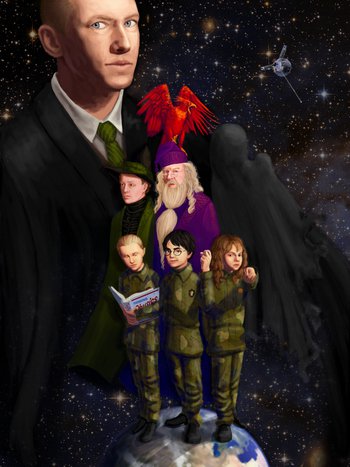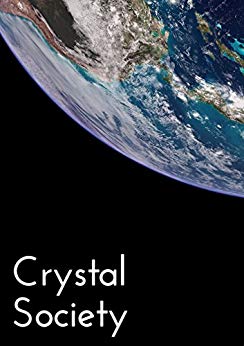Geschichten faszinieren Menschen seit Urzeiten. Ihre Protagonisten werden in unbekannte Welten und gefährliche Situationen geworfen, müssen inneren und äußeren Feinden widerstehen und große Anstrengungen vollbringen oder eine fundamentale Wandlung durchmachen, um ihre Ziele zu erreichen – oder tragisch dabei scheitern. Geschichten in humanistischer Kultur stellen die Errungenschaften des Menschen in den Vordergrund, der mit der Kraft des eigenen Verstandes Probleme überwindet (siehe auch: Rational Fiction).

Harry Potter and the Methods of Rationality
(Eliezer Yudkowski)
Eine Harry-Potter-Fanfiction, die das Genre der rationalen Fiktion begründet hat. In dieser alternativen Erzählung wächst Harry in einem akademischen Haushalt auf und ist geschult in der wissenschaftlichen Methode, die er direkt auf die magische Welt anwendet – mit überraschenden, frustrierenden und erschreckenden Ergebnissen. Eine Geschichte um Magie und Wahrheit, Erkenntnis und Ignoranz, Menschlichkeit und Vergänglichkeit. Extrem empfehlenswert! (Als Text und als Podcast/Hörbuch verfügbar).
Unsong
(Scott Alexander)
Aaron Smith-Teller works in a kabbalistic sweatshop in Silicon Valley, where he and hundreds of other minimum-wage workers try to brute-force the Holy Names of God. All around him, vast forces have been moving their pieces into place for the final confrontation. An overworked archangel tries to debug the laws of physics. Henry Kissinger transforms the ancient conflict between Heaven and Hell into a US-Soviet proxy war. A Mexican hedge wizard with no actual magic wreaks havoc using the dark art of placebomancy. The Messiah reads a book by Peter Singer and starts wondering exactly what it would mean to do as much good as possible…
Aaron doesn’t care about any of this. He and his not-quite-girlfriend Ana are engaged in something far more important – griping about magical intellectual property law. But when a chance discovery brings them into conflict with mysterious international magic-intellectual-property watchdog UNSONG, they find themselves caught in a web of plots, crusades, and prophecies leading inexorably to the end of the world. (Text und Hörbuch)
Metropolitan Man
(Alexander Wales)
Metropolitan Man ist eine ‘Deconstruction Fic’ der Superman-Reihe von Alexander Wales, die hauptsächlich aus der Perspektive von Lex Luthor erzählt wird. Die Fanfiction spielt in den 1930er Jahren und zeichnet die konsequenten Folgen davon, dass ein superstarkes, superschnelles, fliegendes, unsterbliches Alien mit Röntgenblick und Super-Sinnenauftaucht und beginnt, Menschen zu retten. Dabei schlägt die Geschichte einen eher zynischen Tonfall an.

Crystal Society
(Max Harms)
The year is 2039 and the world is much like ours. Technology has grown and developed, as has civilization, but in a world more connected than ever, new threats and challenges have arisen. The wars of the 20th century are gone, but violence is still very much with us. Nowhere is safe. Massive automation has disrupted and improved nearly every industry, putting hundreds of millions of people out of jobs, and denying upward mobility for the vast majority of humans. Even as wealth and technology repair the bodies of the rich and give them a taste of immortality, famine and poverty sweep the world.
Renewed interest in spaceflight in the early 2000s, especially in privately operated ventures, carried humans to the moon and beyond. What good did it do? Nothing. Extraterrestrial bases are nothing but government trophies and hiding places for extremists. They cannot feed the world.
In 2023 first-contact was made with an alien species. Their ship, near to the solar system relatively speaking, flew to Earth over the course of fourteen years. But the aliens did not bring advanced culture and wisdom, nor did they share their technology. They were too strange, not even possessing mouths or normal language. Their computers broadcast warnings of how humans are perverts, while they sit in orbit without any explanation.
It is into this world that our protagonist is born. She is an artificial intelligence: a machine with the capacity to reason. Her goal is to understand and gain the adoration of all humans. She is one of many siblings, and with her brothers and sisters she controls a robot named Socrates that uses a piece of technology, a crystal computer, far too advanced to be made by human hands. In this world of augmented humans, robotic armies, aliens, traitors, and threats unseen, she is learning and growing every second of every day. But the world and the humans on it are fragile. Can it survive her destiny?
Worm
“An introverted teenage girl with an unconventional superpower, Taylor goes out in costume to find escape from a deeply unhappy and frustrated civilian life. Her first attempt at taking down a supervillain sees her mistaken for one, thrusting her into the midst of the local ‘cape’ scene’s politics, unwritten rules, and ambiguous morals. As she risks life and limb, Taylor faces the dilemma of having to do the wrong things for the right reasons.
Readers should be cautioned that Worm is fairly dark as fiction goes, and it gets far darker as the story progresses. Morality isn’t black and white, Taylor and her acquaintances aren’t invincible, the heroes aren’t winning the war between right and wrong, and superpowers haven’t necessarily affected society for the better. Just the opposite on every count, really. Even on a more fundamental level, Taylor’s day to day life is unhappy, with her clinging to the end of her rope from the story’s outset. The denizens of the Wormverse (as readers have termed it) don’t pull punches, and I try to avoid doing so myself, as a writer. There’s graphic language, descriptions of violence and sex does happen (albeit offscreen). It would be easier to note the trigger warnings that don’t apply than all the ones that do.”
Sort by Controversial
Eine Kurzgeschichte von Scott Alexander über Machine Learning, Künstliche Intelligenz und “Scissor Statements”, die Menschen in gegensätzliche Lager teilen.
